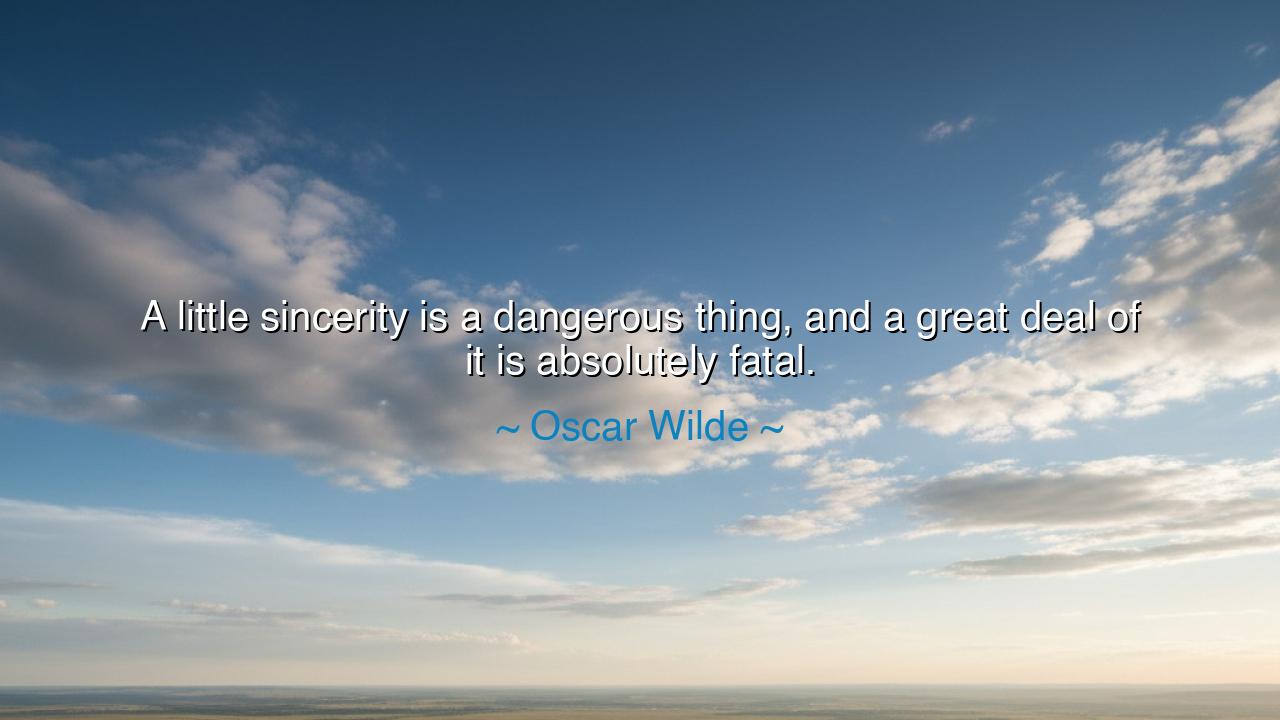
A little sincerity is a dangerous thing, and a great deal of it






Hearken, O children of wit and reflection, and attend to the words of Oscar Wilde: “A little sincerity is a dangerous thing, and a great deal of it is absolutely fatal.” In these words lies a meditation upon the paradox of truth, the peril of excess, and the delicate balance of human expression. From the dawn of civilization, the wise have observed that words and actions, though sincere, may wound or destabilize when wielded without discretion. Wilde’s insight reminds us that sincerity, though virtuous in moderation, can become both a weapon and a folly when left unchecked.
Consider the nature of sincerity. It is the clarity of heart, the honesty of thought, and the courage to express what one truly believes. A measure of it—well-placed, nuanced, tempered—can illuminate truth, foster trust, and inspire action. Yet even a small dose, when unexpected or unfiltered, may unsettle others, revealing vulnerabilities and provoking tension. Wilde, with his characteristic wit, warns that sincerity is not an unalloyed virtue; it carries both power and peril, demanding discernment in its use.
History provides vivid illustrations of this truth. Socrates, in the city of Athens, spoke always with sincerity, questioning the assumptions of his fellow citizens. His honest inquiries, untempered by the desire to soothe, provoked outrage, suspicion, and ultimately his death. Here we see Wilde’s principle enacted: too much truth, too much unbridled sincerity, can unsettle societies and endanger the speaker. The balance of truth and prudence is an art as old as human civilization itself.
Even in more tempered circumstances, a little sincerity can be dangerous. A compliment misperceived, a truth spoken in jest, a candid opinion offered too early—all may ignite conflict, resentment, or misunderstanding. The power of words lies not merely in their content but in the timing, the audience, and the manner of delivery. Wilde’s observation compels us to consider that sincerity is not merely ethical; it is strategic, requiring wisdom, subtlety, and the awareness of consequence.
The cautionary principle extends to public life. Consider Abraham Lincoln, who wielded honesty with careful deliberation, balancing truth with prudence. His Emancipation Proclamation was guided by principle yet framed to unite a divided nation. Excessive bluntness might have provoked resistance or disaster. Wilde’s warning echoes here: sincerity without temper may alienate, disrupt, or destroy; it is the artful measure that transforms honesty into power rather than peril.
From this reflection flows practical wisdom. Speak truth with awareness. Cultivate sincerity tempered by empathy and timing. Learn to gauge the measure that illuminates rather than wounds, inspires rather than alienates. Recognize that honesty, though noble, is a force that must be harnessed with discretion, for even virtue in excess may yield ruin.
Let the generations remember this eternal truth: virtue and danger are often entwined. Oscar Wilde’s words remind us that sincerity, untempered or overwhelming, may harm even as it enlightens. The wise navigate the balance between honesty and discretion, understanding that the skillful deployment of truth preserves both integrity and harmony.
Therefore, O seeker of wisdom, embrace sincerity, but wield it as one would a finely tempered blade. Let honesty guide your heart, yet temper it with prudence, empathy, and strategy. In this measured approach, truth becomes a force of illumination, not destruction, allowing your words and deeds to inspire, enlighten, and endure, rather than wound, alienate, or perish.






AAdministratorAdministrator
Welcome, honored guests. Please leave a comment, we will respond soon